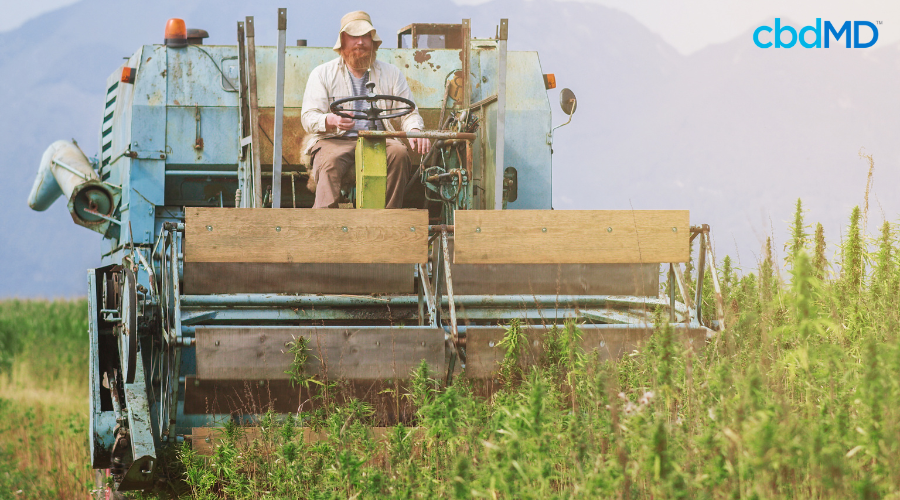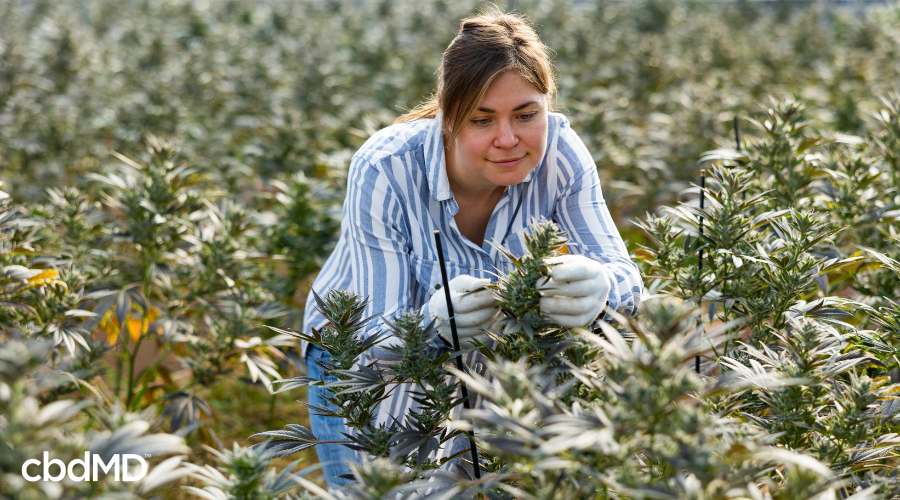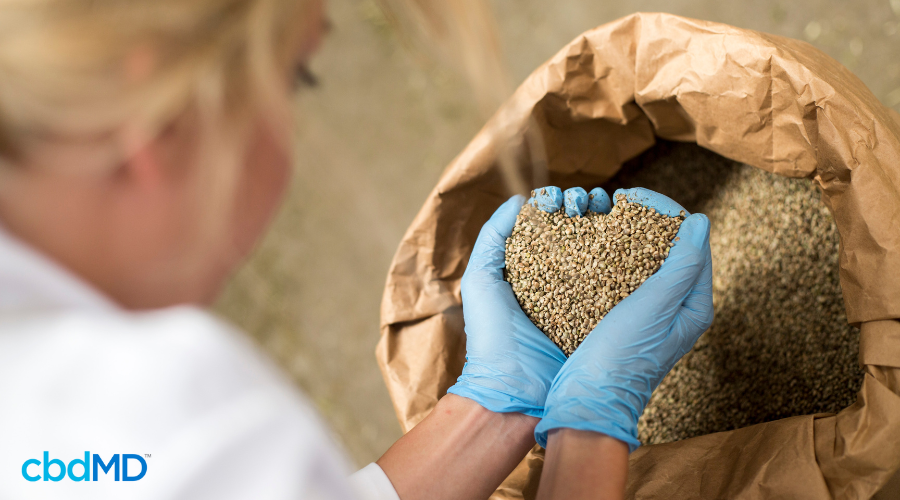Welcome to part three of our blog series dedicated to one of the green wonders of the Earth – hemp! As we’re celebrating Earth Month, we're shining a light on the power of hemp to redefine sustainability. Hemp is more than just a plant, it’s a testament to what sustainable practices can achieve. Whether you're new to the world of hemp or a seasoned advocate, join us as we explore the exciting and sustainable potential that hemp holds.
Read on to unravel the number ways hemp can contribute to a healthier planet and a greener future. And stay tuned for our whole series on hemp to read more about its history, benefits, and future, along with tips on how to make your everyday health and wellness routines part of a greener world.
Understanding Hemp Sustainability
Before we unravel the layers of hemp's sustainable impact, it is crucial to grasp the essence of sustainability. At its core, sustainability is the ability to meet the needs of the present without compromising the ability of future generations to meet their own needs. Hemp embodies this principle with attributes that support ecological harmony and social equity.
Sustainability is a multifaceted term that encompasses social, economic, and environmental aspects. For a practice or resource to be considered sustainable, it should:
- Have a low ecological impact
- Support the local economy
- Demonstrate a capacity for renewal without depletion
- Promote community well-being

Environmental Impact of Hemp
When we consider the environmental benefits, hemp stands tall. Hemp requires a fraction of the water needed for cotton and few to no herbicides, with adaptability to varied soil conditions that contribute to crop diversity.
Reduced Carbon Footprint
Hemp agriculture sequesters carbon in large quantities, with estimates suggesting that carbon capture in hemp farming is comparable to that of forests. Hemp is also a rapid carbon sink, meaning that as hemp plants grow, they absorb carbon dioxide from the atmosphere through photosynthesis, converting it into biomass and organic matter that is stored in the plant's tissues and in the soil. This process helps mitigate the greenhouse effect by reducing the amount of carbon dioxide in the atmosphere, thus contributing to efforts to combat global warming.
Soil Regeneration and Biodiversity
Hemp's deep roots aerate the soil and prevent erosion, contributing to soil health. The extensive root system of hemp plants not only helps anchor the soil, preventing erosion, but also improves soil structure and fertility. By growing deep into the ground, hemp roots break up compacted soil, allowing air, water, and nutrients to penetrate more easily. Furthermore, hemp cultivation can create habitat and forage for pollinators and other beneficial insects, supporting biodiversity in agricultural landscapes.
Water Conservation
Hemp’s water usage is significantly lower than that of conventional crops, an advantage that becomes starkly crucial in regions battling drought and desertification. Hemp has a relatively low water requirement, making it well-suited to regions with limited water resources or where water conservation is a priority. In addition to requiring less irrigation, hemp's deep root system helps conserve water by improving soil structure and reducing runoff and evaporation. This makes hemp cultivation less environmentally taxing than water-intensive crops like cotton.
Mitigation of Deforestation
From structural use to paper and pulp, hemp's versatile woody fibers could be instrumental in preserving our forests. Hemp can be used as a sustainable alternative to traditional wood products, such as lumber, plywood, and paper. By replacing wood products with hemp-based alternatives, we can help reduce the demand for timber from forests and decrease the pressure on forest ecosystems. This can help to mitigate deforestation, which is a major driver of habitat loss, biodiversity decline, and climate change.

Social and Economic Aspects of Hemp Sustainability
Beyond the fields, hemp's economic and social contributions are substantial. It presents opportunities for small-scale farmers and local industries, fostering a more equitable and resilient economy.
Supporting Local Communities
Hemp empowers local communities by providing a resilient staple that can be processed close to where it is grown, limiting the carbon footprint and bolstering community autonomy. By establishing local hemp processing facilities and value-added product industries, communities can capture more of the economic benefits within their regions. This localization of hemp production and processing not only reduces transportation emissions but also creates jobs and economic opportunities in rural areas where they are often most needed.
Employment Opportunities
The burgeoning hemp industry spans from cultivation to product development, offering a diverse job market that can address unemployment issues in rural settings. From farm laborers to processors, manufacturers, marketers, and retail workers, the hemp industry offers a wide range of employment opportunities across various skill levels and sectors. Moreover, as the industry continues to grow and diversify, it has the potential to create new jobs and stimulate economic growth in regions that have been historically marginalized or underserved.
Economic Viability for Farmers
With lower input costs, higher market value for products, and reduced reliance on subsidies and external inputs, hemp farming can reinvigorate agricultural livelihoods. Hemp cultivation requires minimal inputs such as water, fertilizers, and pesticides, making it a cost-effective and sustainable option for farmers looking to diversify their crops and increase their income. Additionally, hemp products often command higher market value due to their sustainability credentials and high-quality attributes, providing farmers with greater financial stability.
Ethical Considerations in Hemp Production
Unlike some conventional crops that rely on cheap labor and expose workers to hazardous chemicals, hemp cultivation prioritizes worker safety and environmental stewardship. Additionally, hemp's versatility and potential for regenerative agriculture make it a promising tool for addressing social and environmental justice issues, such as rural poverty, and food insecurity. By promoting ethical labor practices and supporting initiatives that prioritize social responsibility, the hemp industry can set a positive example for agricultural sectors worldwide.

Hemp Promotes Sustainability in Various Industries
The applications of hemp are as diverse as they are sustainable, being introduced to sectors that have the potential to significantly reduce our environmental burden.
Food and Nutrition
The plant's value as a sustainable superfood is compounded by its ability to grow in diverse climatic conditions, supporting global food security. Hemp seeds are high in protein, omega-3 and omega-6 fatty acids, fiber, vitamins, and minerals, making them a nutritious addition to a balanced diet. Hemp oil, extracted from the seeds, is rich in antioxidants and has anti-inflammatory properties, offering numerous health benefits. By incorporating hemp seeds and oil into their diets, consumers can promote healthier, more environmentally friendly food systems.
Textiles and Fashion
Hemp textiles are durable, comfortable, and increasingly on-trend. They can provide ecologically sound alternatives to conventional fabrics, especially in the fast-fashion space where environmental degradation and textile waste is rampant. Unlike cotton, which requires vast amounts of water and chemical pesticides to cultivate, hemp grows prolifically with minimal inputs, making it a more sustainable choice for textile production. Additionally, hemp fibers are naturally resistant to mold, mildew, and UV radiation, prolonging the lifespan of hemp garments.
Building and Construction
Hempcrete, a versatile and environmentally-friendly building material made from the woody core of the hemp plant, offers a sustainable substitute for traditional concrete. Hempcrete is lightweight, breathable, and insulating, making it ideal for use in walls, floors, and roofs. Its high thermal mass helps regulate indoor temperatures, reducing the need for heating and cooling energy. Furthermore, hempcrete is non-toxic, fire-resistant, and biodegradable, making it a safer and more environmentally friendly alternative to conventional building materials.
Biofuels and Plastics
The energy potential of hemp as a biofuel offers a renewable and clean alternative to fossil fuels. Hemp biomass can be converted into biofuels such as biodiesel and ethanol. These biofuels emit fewer greenhouse gasses and pollutants than traditional fossil fuels, making them a more environmentally friendly option for transportation and energy production. Similarly, hemp plastics present a sustainable solution to the crisis of plastic pollution. Hemp fibers can be used to reinforce biodegradable plastics, reducing their environmental impact.
Being Sustainable with Hemp
The story of hemp’s sustainability is ongoing and filled with potential to change our environmental impact. We're on the brink of a big shift towards eco-friendly practices, and it's crucial to support and encourage the use of hemp for a greener future.
By choosing hemp products that are grown responsibly, shoppers can push the industry to focus more on being eco-friendly. Here at cbdMD, we ensure purity in our CBD products by using a unique process and sourcing our hemp from local American farms. This lets us keep a close eye on our products’ quality. We prefer using natural hemp over synthetic alternatives or hemp from places with lower growing standards. Our approach starts with selecting the best hemp, straight from U.S. farms known for high-quality standards, followed by third-party testing and COAs.
Join us in promoting hemp this Earth Month. By working together, we can create a future where living sustainably is part of everyone's lifestyle.
Are you enjoying the sustainability of hemp already? Tell us how you integrate hemp into your green lifestyle by tagging us on Facebook, Instagram, or X.

